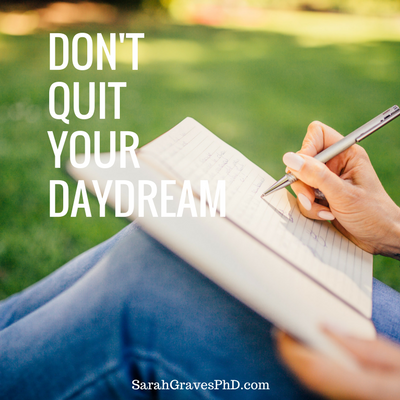When I was a little girl, growing up in the 1980s, I just knew I was a writer. It wasn’t even a question of, “What do you want to be when you grow up?” I was a writer. Right then. Right there. Writing, for me, wasn’t a job; it was who I am.
I’ve devoured books for as long as I can remember, and some of my favorite childhood memories are of trips to the library with my mom, searching the stacks for books about unicorns. The moment I learned how to put pen to paper, I was scribbling short stories about anthropomorphic fruit that also happened to be superheroes, and I wrote my first novel in the first grade – a dystopian fantasy about alien unicorns who arrived on earth via meteor to save the world.
But something changed during my teen years. I began to associate writing, not with making art, but with making a living. And too many well-meaning adults warned me, “You can’t make a living as a writer.” Skip ahead a few decades, and in the quest for a “day job,” I somehow lost touch with the part of me that used to write about magical creatures in distant galaxies for the sheer fun of it. And I, sure as heck, was too busy with my day job to worry about how anyone made a living as a writer.
But then I found myself one afternoon, standing in front of a class of students, lecturing about good paragraph structure while staring out at a sea of faces, some of whom harbored writing dreams just as I had so many years ago. And suddenly I could’ve cared less about teaching paragraphs. I didn’t want to be another voice in their lives that told them what they couldn’t do. Faced with an economy where the gap between the rich and the poor is quite simply – ridiculous, where being middle class doesn’t mean much any more about one’s ability to get by, these kids already have it hard.
Even more, the publishing world in 2018 looks nothing like it did way back in my day. The 1980s were the heyday of the traditional publishing industry, producing such giants as Stephen King and Michael Crichton. Back then, to be a bestseller meant something. (It means less today.) And to “make it” in the industry, you essentially had to get struck by lightning. You had to be that flash-in-the-pan that was the special result of good timing, good connections, and good luck. It was the reason so many adults looked on me with pity and routinely dismissed my aspirations with a simple, “Don’t waste your time, kid.”
So, filled to the brim with a whole bunch of discouragement and a lack of grit built on a solid foundation of social anxiety, I didn’t. But, even though I set the dream aside for a while, I never gave up being a writer. After all, writing was never a job, remember? It’s who I am, and I could never turn it off completely. My mind never stopped dreaming up characters and placing them in precarious situations. It wasn’t a faucet that ever stopped dripping.
That’s the crux of the whole problem, though. I can only speak from my experience as a writer, but I imagine it’s true of all artists. You can’t ever really turn it off. You can only bury it for a while, while it keeps haunting you below the surface, creating a kind of low-grade depression born of ignoring the thing you were meant to be doing, the person you were meant to be being.
So, as I looked out at that sea of faces, all my students looking back at me, waiting for my next words, I just couldn’t seem to help myself. “Don’t ever let anyone tell you, you can’t do it,” I told them. “Because you absolutely can.”
It is definitely a different world these kids are inheriting. Some things are harder. But other things aren’t. Where the idea of making a living as a writer may have been a pipe-dream in the 1980s and 90s, technology has revolutionized the industry. Like never before, each individual has the power within their own hands to make their dreams a reality. Technology grants us the power to create our own audiences, and with this power, it’s no longer necessary to wait for lightning to strike. Anyone can build a profitable side-hustle, or even full-time income, with their art. It might require a little bit of creative thinking to figure out how best to do that for your art and your message, but it is possible.
You don’t have to be a starving artist.
With the advent of the ebook, self-publishing no longer carries the stigma it once did. In fact, many authors who have been traditionally published are intentionally choosing the indie route, because it carries a much greater potential for income. Thus, where once you had to be a household name in order to quit your day job, it’s no longer a requirement. What you do have to do is slowly nurture an audience over time with good writing that keeps them coming back for more.
But such a thing is doable; writers are doing it every day. Making a living with your art no longer means waiting to be chosen; it means choosing yourself.
And this digital revolution is not limited to the writing industry. Even before the take-over of the ebook, music had gone digital. Many musicians are discovering for themselves that it’s actually more profitable to keep all the song rights in one’s own hands than to give them over to a label. One might think the advantage of a publishing house or a record label would be in the promotion, but most authors and musicians never find that to be the case. Writers have to take promotion into their own hands whether they self-publish or traditionally publish. But with self-publishing, you get to keep more of the royalties. Similarly, musicians find that what really makes their careers is getting in front of audiences and building relationships with them. For relationship marketing to really work, it’s often more advantageous to get in front of smaller audiences than larger ones, believe it or not.
What’s even more fundamental to the conversation, though, is the radical 180 degree shift in what defines stability in this new economy. According to a recent report on freelancing in America, 35% of the American economy is currently made up of freelancers. And this figure is projected to become a majority in the next decade. Perhaps even more startling, 50% of millennials currently freelance. The younger generation (I’m Gen X), having grown up in a far more unstable economy, have different ideas about the nature of work and what it means to collect a “steady paycheck.” No job in the year 2018 is guaranteed to last. Whether because the industry becomes obsolete, the company goes belly-up, or you get let go. (Many states employ “at will,” which means they can let employees go for any reason. It doesn’t have to be because you weren’t good at your job.) Thus, to be a worker in today’s economy means there’s no such thing as a “steady paycheck” (the reason so many adults told my younger self not to pursue a living as a writer).
In fact, where the idea of working for oneself (freelancing) used to be considered a rather insecure way to make a living, the reverse has actually become more true today. After all, at least if you work for yourself, you know you can never loose your job. More, you know that no matter what happens in the world, you’ll always find a way to bring in some money.
Even for many who do still work “steady” jobs, the side-hustle has become a thing of the new economy. Due to changing economic conditions, it keeps getting harder and harder for those making a traditionally middle-class income to get by. Thus, many work at day jobs and then come home to some type of side-hustle. So, the idea of freelancing really doesn’t mean at all what it once did. Many, many people are doing it in some kind of capacity because it means greater control over your own destiny.
And one can certainly sell anything – whether it’s hand-beaded necklaces on Etsy or the album your band has produced. It does require developing some business savvy: learning how to market your work, how to grow an audience and nurture it over time, how to build a website and use social media, etc. And maybe not everyone can be J. K. Rowling or John Bon Jovi or Georgia O’Keefe, but you can learn how to build a website and market and sell your work. And you can make some kind of a living from it, without being J. K. Rowling or Jon Bon Jovi or Georgia O’Keefe.
And it’s never been more possible than right freakin’ now.

Have you ever felt challenged to “live your dream”? Please share your struggles and triumphs in the comments section below!

